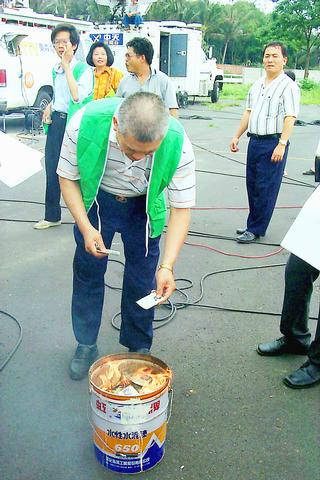Legislator Hsu Tain-tsair (
"I have confidence that I will be able to dismiss [some local party members'] opposition [to my candidacy]. So, let's all work together to win this race," Hsu said yesterday morning in Tainan city.
He added that he would pay a visit to incumbent Tainan Mayor George Chang (

PHOTO: WU HSIN-HWA, TAIPEI TIMES
Hsu's nomination has met with strong protests from some Tainan party members who believe he is a traitor. Some 10 party members -- most of them supporters of Mayor Chang -- yesterday afternoon staged another protest in front of the party's local headquarters. They burned their membership cards to show their disapproval of the party's choice, reiterating that "the party should not have nominated Hsu."
In response to the demonstrators' anger, party officials in Tainan said that "the party allows freedom of expression by all party members."
"However, party discipline will be imposed if they intentionally try to boycott the party's candidate later on," executive director of the party's Tainan Division, Wang Ding-yu (
Wang said that the DPP had made the decision according to its nomination regulations, therefore, "Hsu is a legitimate candidate."
He added that Hsu would also be the party's best choice because local polls held before his nomination found that the DPP could secure 44 percent of the vote in Tainan if they nominated him for mayor.
Wang said that without Hsu, polls showed that the DPP would likely garner 22 percent of the vote in the year-end mayoral election, the KMT 11 percent and the People First Party 10 percent.
Therefore, he added, it was very important for the party to nominate "the right candidate."
In Kaohsiung yesterday DPP Chairman Frank Hsieh (
"Hsu's nomination was made by the party's highest decision-making body, the Central Executive Committee. Therefore, the party followed democratic procedures [to nominate Hsu] and all party members should support the decision," Hsieh said.

Intelligence agents have recorded 510,000 instances of “controversial information” being spread online by the Chinese Communist Party (CCP) so far this year, the National Security Bureau (NSB) said in a report yesterday, as it warned of artificial intelligence (AI) being employed to generate destabilizing misinformation. The bureau submitted a written report to the Legislative Yuan in preparation for National Security Bureau Director-General Tsai Ming-yen’s (蔡明彥) appearance before the Foreign Affairs and National Defense Committee today. The CCP has been using cognitive warfare to divide Taiwanese society by commenting on controversial issues such as Taiwan Semiconductor Manufacturing Co’s (TSMC, 台積電) investments in the

INVESTIGATION: The case is the latest instance of a DPP figure being implicated in an espionage network accused of allegedly leaking information to Chinese intelligence Democratic Progressive Party (DPP) member Ho Jen-chieh (何仁傑) was detained and held incommunicado yesterday on suspicion of spying for China during his tenure as assistant to then-minister of foreign affairs Joseph Wu (吳釗燮). The Taipei District Prosecutors’ Office said Ho was implicated during its investigation into alleged spying activities by former Presidential Office consultant Wu Shang-yu (吳尚雨). Prosecutors said there is reason to believe Ho breached the National Security Act (國家安全法) by leaking classified Ministry of Foreign Affairs information to Chinese intelligence. Following interrogation, prosecutors petitioned the Taipei District Court to detain Ho, citing concerns over potential collusion or tampering of evidence. The

‘COMPREHENSIVE PLAN’: Lin Chia-lung said that the government was ready to talk about a variety of issues, including investment in and purchases from the US The National Stabilization Fund (NSF) yesterday announced that it would step in to staunch stock market losses for the ninth time in the nation’s history. An NSF board meeting, originally scheduled for Monday next week, was moved to yesterday after stocks plummeted in the wake of US President Donald Trump’s announcement of 32 percent tariffs on Taiwan on Wednesday last week. Board members voted to support the stock market with the NT$500 billion (US$15.15 billion) fund, with injections of funds to begin as soon as today. The NSF in 2000 injected NT$120 billion to stabilize stocks, the most ever. The lowest amount it

NEGOTIATIONS: Taiwan has good relations with Washington and the outlook for the negotiations looks promising, Minister of Economic Affairs J.W. Kuo said Taiwan’s GDP growth this year is expected to decrease by 0.43 to 1.61 percentage points due to the effects of US tariffs, National Development Council (NDC) Minister Paul Liu (劉鏡清) said at a meeting of the legislature’s Economics Committee in Taipei yesterday, citing a preliminary estimate by a private research institution. Taiwan’s economy would be significantly affected by the 32 percent “reciprocal” tariffs slapped by the US, which took effect yesterday, Liu said, adding that GDP growth could fall below 3 percent and potentially even dip below 2 percent to 1.53 percent this year. The council has commissioned another institution